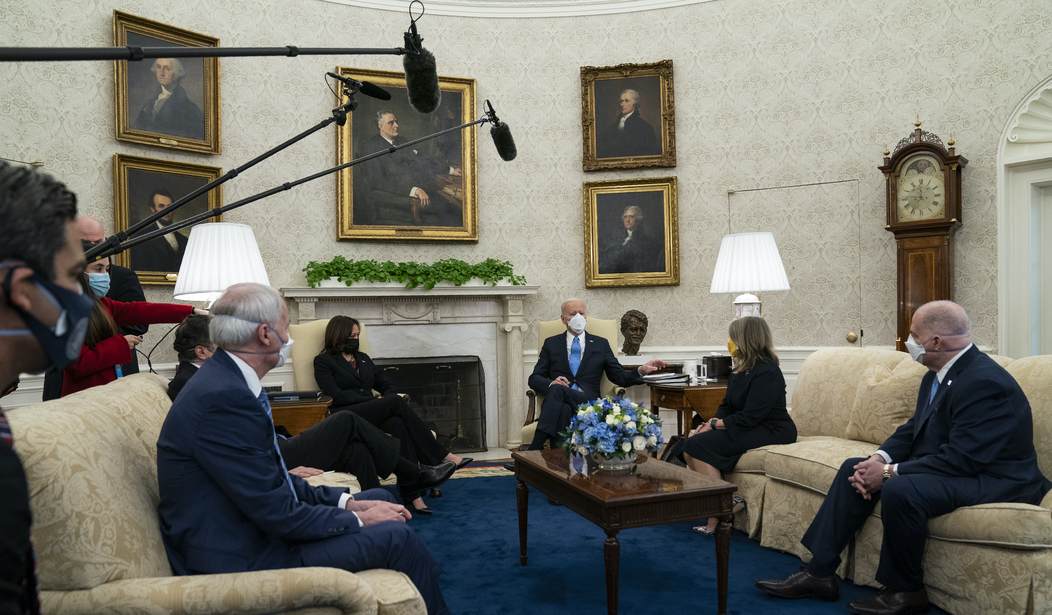Eleven Republican senators will support the bipartisan framework for an infrastructure bill, opening up the possibility that such legislation could pass the Senate if all 50 Democrats support it.
For that to happen, Joe Biden would have to give his blessing. Biden says he hasn’t even read the bipartisan proposal yet. Radicals like Senators Bernie Sanders and Elizabeth Warren would have to drop their opposition to it, and other Republicans would have to agree not to torpedo a bill by loading it with “poison pill” amendments and other deal-killers.
Other than that? Piece of cake.
In a statement Wednesday, 21 Democratic and GOP senators endorsed the roughly $1 trillion proposal, which would not raise taxes on corporations or wealthy individuals. The plan would revamp transportation, broadband and water, but would not meet many Democrats’ goals for investments in clean energy and social programs.
“We look forward to working with our Republican and Democratic colleagues to develop legislation based on this framework to address America’s critical infrastructure challenges,” the senators said in a statement.
Meanwhile, Democrats on the Senate Budget Committee are laying the groundwork to ram through the much larger Biden infrastructure plan using budget reconciliation. That bill — worth $2.3 trillion — would fund a wide variety of non-infrastructure projects dealing with climate change, child care, and other social programs.
Related: ORWELLIAN: Biden Redefines Basic Terms to Ram His Agenda Down Americans’ Throats
But there’s no guarantee that all 50 Democrats would be on board for reconciliation. Several moderate senators, including Joe Manchin and Krysten Sinema, have expressed reservations to one degree or another about passing a partisan infrastructure bill. It’s by no means a done deal.
A handful of liberals in the Senate have threatened to vote against the bipartisan deal, which they say does not do enough to fight climate change or income inequality. If any Democrats oppose the plan, more than 10 Republicans would need to back it for it to hit the 60-vote threshold to pass legislation in the Senate.
Some Democrats have suggested their party could approve a physical infrastructure plan with Republican support if skeptics get assurances their priorities will be addressed later. Democrats could then move to pass broader investments in child and elder care, green energy, education and health care on their own through budget reconciliation.
Biden, for his part, is watching and waiting. Making the wrong move now could blow up his presidency. If he signs on to the bipartisan framework, he’s committing the weight and prestige of his office to a proposition with dubious chances of success. If he rejects it, he risks alienating those same moderates he needs to pass reconciliation. He risks getting nothing if he makes the wrong move.
The Republicans who signed Wednesday’s statement are Sens. Richard Burr, of North Carolina; Bill Cassidy, of Louisiana; Susan Collins, of Maine; Lindsey Graham, of South Carolina; Lisa Murkowski, of Alaska; Rob Portman, of Ohio; Mitt Romney, of Utah; Mike Rounds, of South Dakota; Thom Tillis, of North Carolina, Todd Young, of Indiana, and Jerry Moran, of Kansas.
The Democrats who joined them are Sens. Chris Coons, of Delaware; Maggie Hassan, of New Hampshire; John Hickenlooper, of Colorado; Mark Kelly, of Arizona; Joe Manchin, of West Virginia; Jeanne Shaheen, of New Hampshire; Kyrsten Sinema, of Arizona, and Mark Warner, of Virginia. Sen. Angus King, a Maine independent who caucuses with Democrats, also signed the statement.
Republicans have been short on details regarding how they plan to pay for a trillion-dollar infrastructure bill.
Paying for the infrastructure plan could be an issue. Republicans have insisted they will not touch their 2017 tax law, which cut the corporate rate to 21%. Biden wants to hike the corporate tax to at least 25%.
The president has also promised not to increase taxes on anyone making less than $400,000 per year. A possible revenue raiser in the bipartisan plan — tying the gas tax to inflation — could effectively break his pledge.
So it looks like both sides want to fund the plan using smoke and mirrors. And the deficit will continue to rise and the debt will continue to explode.
Not a very satisfactory state of affairs.










Join the conversation as a VIP Member